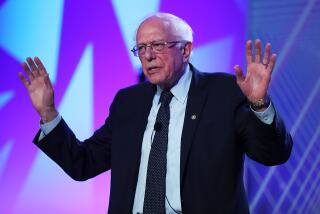Standing Alone : Politics: Vermont has always liked mavericks, and now it has one in Congress--socialist Bernie Sanders, who answers only to himself.
- Share via
BURLINGTON, Vt. — Wait a minute. Isn’t that a “Perot for President” bumper sticker on Bob Burnor’s Chrysler, next to the red-and-white rectangle that says, simply, “Bernie”?
Isn’t one of those guys a conservative multi-billionaire from Texas who is making his political debut with a push for the White House? Isn’t that other guy a socialist who has made a career of disdaining the rich?
Does it matter that Ross Perot and Rep. Bernard Sanders of Vermont share little more than political ambition and increasing visibility outside the traditional two-party mainstream?
Burnor, a businessman here, answers with a shrug. “I like Perot for the same reasons I like Bernie,” he says. “They don’t answer to anybody.”
Sanders, the first independent elected to Congress in more than 40 years (and the first socialist since 1923), is quick to trumpet the force of third-party politics. Americans are increasingly dissatisfied with the political status quo, Sanders says, and both he and Perot are profiting from “an amorphous anger” that is “throwing a major body blow” at two-party politics.
“Even I am amazed at the ease with which that citadel is crumbling,” he says.
Twenty-plus years after he began running for office outside the Democratic and Republican parties, Sanders sounds not a bit a smug in this pronouncement--just absolutely convinced that the era of the independent has arrived.
As a 50-year-old first-term congressman, Sanders has positioned himself as a professional outsider who says the voters of this least populous of states selected him not to bring back the bacon but “to expose a corrupt, unresponsive government--to shake it up, to make it more responsive.”
He advocates nationalized health care, drastic cutbacks in military spending, increased support for family farms and employment benefits like child care and extended parental leave. He supports the right to abortion and opposes certain forms of gun control.
He says he speaks for those who feel disenfranchised by conventional politics: “women, workers, the elderly, minorities, farmers, young kids, environmentalists, peace activists.”
Add those people together, says Sanders, and “you got a majority of Americans.”
With his once-unruly white hair neatly combed forward--to conceal a bald spot--Sanders can often be seen on the House floor. Equally significant in the cacophony of the U.S. Congress, this impassioned, charismatic orator can generally be heard. In fact, it is often hard not to hear Bernie Sanders when he steps forward to shout out his capital-A Agenda.
“He gets up there and blows spit all over the first 10 rows and chews the rug,” says another Vermont politician. “He’s quite a speaker.”
Here are some highlights of Sanders’ political gospel:
* The Balanced Budget Amendment is “just another gimmick” of an Administration whose economic policies are “a fraud.”
* Bankers, especially leaders of the savings and loan industry, are “a bunch of thieves and crooks.”
* The White House is “a mental hospital where people are completely divorced from reality.”
* Congress is “impotent,” and “if 80% of the men and women in it lost the election tomorrow, I wouldn’t lose a night’s sleep.”
Such opinions do not necessarily endear Sanders to his colleagues. One person who used to work with him, for example, suggested taking up a collection “to send Bernie to charm school.”
Another colleague, Rep. Gerald Solomon (R-N.Y.), grumbled after a recent Sanders soliloquy: “You’ve just heard from the only registered socialist in the House. Now let’s hear from the real world.”
Here in Vermont, however, many people are content with Sanders’ version of reality. The state’s only congressman, Sanders defeated a Republican incumbent in 1990 with a 17% margin of victory. No Democrats have declared against him for the 1992 congressional election, and polls show him holding a comfortable lead over three Republicans.
“Bernie may not get a lot done in Washington,” says Joe Young, an unemployed electrician from a village in Vermont’s remote Northeast Kingdom. “But at least he gets heard.”
Says former Gov. Madeleine Kunin: “In his first term, raising hell was good enough. But, she adds, “in his second term, I think he does have a higher burden of proof.”
Others decry what they regard as Sanders’ tired old leftist rhetoric. “Bernie Sanders is the living embodiment of many Vermonters’ contempt for Washington, but he in no way reflects the sentiments of this state,” says Brian Cosgrove, executive director of the Vermont State Republican Committee.
“He professes a sort of shop-worn 1930s labor union style of argument.”
Sanders spent most of the 1970s running for office in Vermont. He made several tries for the governorship and also ran for the U.S. Senate. In 1981 he finally won an election--as mayor of Burlington. With somewhat different intonations, detractors and admirers alike still describe Sanders’ 10-vote margin in that election as “stunning.”
But Sanders’ political yearnings began even earlier. The son of a Brooklyn paint store owner, Sanders was raised in the kind of family in which debates about injustice were a dinner time staple. Campaigning for the presidency of his high school student body, he urged the school to adopt a Korean orphan. He came in third.
At the University of Chicago, Sanders majored in psychology and minored in sit-ins to protest segregated campus housing. By the time he migrated to Vermont in 1968, Sanders was a member of the Socialist party.
And that position as a socialist helped the onetime carpenter and psychiatric aide put Burlington--and himself--on the national political scope. Observes Garrison Nelson, a professor of political science at the University of Vermont and a longtime friend of Sanders: “Mayors of cities of 40,000 don’t get national prominence. Bernie did.”
Sanders’ vociferous championing of low-income housing and job programs, improved transportation, public education and community health care helped make Burlington a synonym for urban social consciousness. In the fashion of the California communities of Berkeley and Santa Monica, this enclave alongside Lake Champlain became known under Sanders’ stewardship as the Peoples’ Republic of Burlington.
Along with his masterful style of street campaigning, Sanders displayed an uncanny knack for publicity. Burlington’s city charter makes the mayor a rather weak figure, according to Ken Wild, an editor at the nearby Rutland Herald. “But Bernie injected himself into everything,” Wild says. “So the general public got the feeling that he was actually running something.”
Wild recalls one occasion when newspaper and television pictures portrayed Sanders pulling the switches on Burlington’s new fireboxes. “Now Bernie had nothing to do with getting those fireboxes there. That was the work of the Fire Commissioner,” Wild says. “But there he was, in every single picture.”
Seizing the visibility of his office in that manner reflects Sanders’ “very dominating personality,” Wild says. “But Bernie is not all hot air. I think he means what he says--and I think he has great public relations instincts.”
That acumen helped Sanders make his brand of socialism sound almost exotic. Early on in his mayoralty, his campaign workers became known as “Sanderistas.” Later, Vermont’s own version of a third political party, the Progressive Coalition, evolved--with Sanders as its leader.
His forceful personality and his political persistence also fed into Vermont’s longstanding affinity for mavericks, says state Sen. Sally Conrad (D-Vt.).
“Perhaps it’s a certain rebellious streak in Vermonters,” she says. “You could wax eloquent and say it comes with the rugged terrain, and all that garbage. But I think a large part of it is that we’re like a big neighborhood. We kind of like odd, flamboyant characters who are a bit out of the ordinary. We don’t like people who don’t take a stand, people who equivocate.”
His unwillingness to equivocate nearly sent Sanders to a kind of Siberian exile when he arrived on Capitol Hill in 1990. He fought over committee assignments--and eventually won, earning a spot on the House Banking Committee. He also fought over almost everything else that happened to come across his transom, nearly alienating much of the U.S. Congress in the process.
“His holier-than-thou attitude--saying in a very loud voice that he is smarter than everyone else and purer than everyone else--really undercuts his effectiveness,” Rep. Barney Frank (D-Ma.) said six months into Sanders’ term.
Sanders’ abrasiveness helped to cement the odd-man-out status that he seemed to covet in Congress, Rep. Joe Moakley (D-Ma.) said not long after Sanders arrived on Capitol Hill.
“He’s out there wailing on his own,” Moakley said. “He screams and hollers, but he’s all alone.”
But by early this summer, Frank, for one, had tempered his view. “He had some initial adjustment difficulties--collegiality didn’t come easily,” Frank says. “But he now fits in. He’s very much an outsider, but not an outsider in the sense that he is isolated.”
As a congressional newcomer, Frank says, Sanders “was stressing the kind of tribune-of-the-people role to the detriment of effective legislation.” But as his first term comes to a close, Frank says, Sanders has learned that “legislating is a very peculiar business. Most people get better at it as time goes on, including Bernie Sanders.”
Sanders has even found it within his power to say something almost nice about Congress. “To my surprise,” he says on a ride through the Vermont countryside, “there are 30 to 40 decent and hard-working people there, people who are not household words--working day after day, knocking their brains out.”
With the finesse that even his critics have to admire, Sanders also deflects criticism of his $125,000 annual congressional salary.
He and his wife Jane (whom he met and married during his term as mayor) have a combined family of four high school- and college-age children--and education is not cheap, Sanders says, almost defensively. He maintains residences in Burlington and Washington, spending three to four days a week in each. But “I don’t think I’ve suddenly become terribly upper class,” Sanders bristles.
Some observers say Sanders’ feisty sense of independence has won him the status of an emerging legend in Vermont politics, moving into what Garrison Nelson calls a “larger-than-life presence.”
But others, including Cosgrove, caution that Sanders may be “more of a symbol than a person, and it’s a very short trip from symbol to caricature.”
Is Sanders concerned? Speaking to an auditorium full of high school girls--members of Vermont’s Green Mountain Girls State assembly of junior legislators--the congressman seems not to care about how he is perceived, by anyone.
“Almost everything you do is political,” he tells his young audience. “If you don’t understand that, you’re not only not a real American, you’re not a serious person.”
The Gospel of Bernie Sanders
* The Balanced Budget Amendment is “just another gimmick” of an Administration whose economic policies are “a fraud.”
* Bankers, especially leaders in the savings and loan industry, are “a bunch of thieves and crooks.”
* The White House is “a mental hospital where people are completely divorced from reality.”
* Congress is “impotent,” and “if 80% of the men and women in it lost the election tomorrow, I wouldn’t lose a night’s sleep.”
More to Read
Get the L.A. Times Politics newsletter
Deeply reported insights into legislation, politics and policy from Sacramento, Washington and beyond. In your inbox twice per week.
You may occasionally receive promotional content from the Los Angeles Times.










